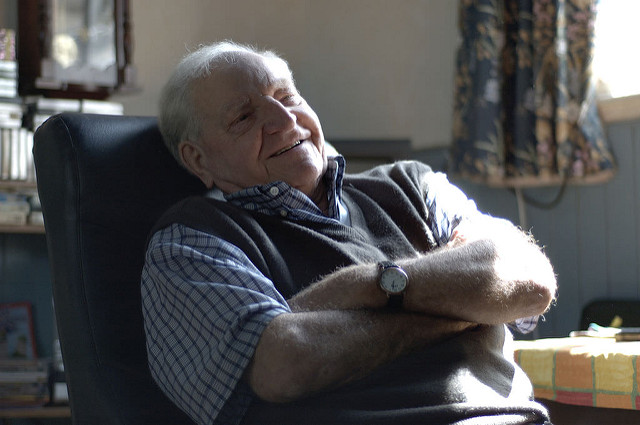Unlock the Magic in Your Story Now
Get the Free 20 questions to Ask Before Launching Your Idea workbook when you sign up for occasional updates.
Get the Free 20 questions to Ask Before Launching Your Idea workbook when you sign up for occasional updates.
The Value Of Goals And Outcomes
 We tend to think of goals and outcomes as one and the same. They’re not.
We tend to think of goals and outcomes as one and the same. They’re not.
Let’s say your goal is to run a marathon. Crossing the line at the end of the twenty-sixth mile is your goal. But the effect of the actions you take by trying to achieve that goal is worth more than having run the race.
Getting ‘there’ feels good. But never discount the value of what you’re learning as you go.
Image by Shutter Runner
Share this article
Effort, Performance And Joy
 The indoor bikes at my gym have a display monitor on the front. The monitor is designed to show you how much effort you’re putting into your workout. In theory the monitor helps you to get better results. You can see how the combination of your speed and resistance increases your power output. You can measure the distance you’ve travelled and the calories you’ve burned.
The indoor bikes at my gym have a display monitor on the front. The monitor is designed to show you how much effort you’re putting into your workout. In theory the monitor helps you to get better results. You can see how the combination of your speed and resistance increases your power output. You can measure the distance you’ve travelled and the calories you’ve burned.
A constant awareness of the numbers is supposed to help you improve your performance. But I’ve found that it sometimes has the opposite effect. It’s hard not to just stare at those numbers for the whole time you’re on the bike. When you focus mainly on the numbers, you tell yourself a story about how well you’re doing compared to yesterday. You’re not thinking about the aggregate measurement of your performance over time or about the benefits of showing up day after day—week in, week out. You’re simply trying to increase your effort. You’re thin-slicing in the most unhelpful way. And you’re taking all of the joy out of working out.
Something surprising happens when you cover the monitor, avoid looking at the numbers. Suddenly you’re more aware of your body and how it’s capable of responding. You’re not limited by your perception of yesterday’s performance. You don’t have a mental ceiling about what’s possible. And so you not only achieve better results, you enjoy the ride.
We tend to believe the secret to improving performance is to pay attention to our output—that prioritising the numbers is what makes them go up. The numbers are just one sign that you’re on the right track. There are a hundred different ways you can improve them over time. But staring straight at the numbers and lamenting about what you’re not achieving right this second isn’t one of them.
Journeying is the act of travelling from one place to another—not a moment of arrival.
You get there by being committed to the journey.
Image by R Reeve
Share this article
Priorities And Metrics
 We often default to using narrow parameters to qualify worthiness or quantify excellence. We focus on a company’s revenue or an entrepreneur’s net worth, count the number of books an author sells or followers an influencer amasses.
We often default to using narrow parameters to qualify worthiness or quantify excellence. We focus on a company’s revenue or an entrepreneur’s net worth, count the number of books an author sells or followers an influencer amasses.
What we choose to measure has a direct impact on what we then prioritise. And of course, what we prioritise determines the kind of companies and communities we build.
Better then, to set our priorities first and metrics later.
Image by Andrew
Share this article
A Question Of Pride
filed in Success
 Like most of their friends and neighbours from big Irish-Catholic families, my grandparents didn’t have the luxury of an education. They were not bookish, in fact, they were barely literate. They couldn’t teach me much about history or science. But they taught me a lot about pride.
Like most of their friends and neighbours from big Irish-Catholic families, my grandparents didn’t have the luxury of an education. They were not bookish, in fact, they were barely literate. They couldn’t teach me much about history or science. But they taught me a lot about pride.
My grandparents may not have had status, but they did have a place in their community. They valued fairness and doing the right thing by their neighbours. Their door was always open—kettle always on. They shared the little they had. They worked through their problems, knowing they didn’t have the all the right answers. They were not afraid of failure or a hard day’s work. They proudly sent their children to school in clean clothes with full bellies. And while their aspirations might seem small by today’s standards, they were huge by theirs—at a time when people lived from hand-to-mouth. Week-to-week. Brown envelope to brown envelope. I think my grandparents, and yours too could teach us a lot about how to live and work today.
Our grandparents would probably tell us to stop deferring to others (and Google) to find the answer and to start reflecting on what was right by, and for us? They would ask us why we’d stopped making fewer decisions that spoke to our heart. They would question our belief that success could be plotted on a graph with a neverending upward trajectory. They would wonder when it became fashionable to think that pride was just a vice that would surely come before a fall.
Growing up, I was lucky to be surrounded by people whose metric of success was doing what they were proud to have done. I can’t think of a better way for us to measure what matters.
Image by Alastair Green
Share this article
Progress And Potential
filed in Innovation, Strategy
 Nobody knows who invented the button five thousand years ago. At first, buttons were simply used to adorn clothing. It wasn’t until the invention of the buttonhole three thousand years later that buttons became functional. It took us two thousand years to reimagine what the button could do. And in that moment fashion and even the fabric of our society was changed forever.
Nobody knows who invented the button five thousand years ago. At first, buttons were simply used to adorn clothing. It wasn’t until the invention of the buttonhole three thousand years later that buttons became functional. It took us two thousand years to reimagine what the button could do. And in that moment fashion and even the fabric of our society was changed forever.
The invention of the buttonhole meant we had a more reliable way of securing our clothes. Instead of having to drape ourselves in swathes of cloth, we could wear more fitted garments that used less fabric. Clothing could be designed not only to cover bodies but also to subtly reveal them. People were free to move more easily because their clothing stayed put. That newfound freedom likely had a knock-on effect on both creativity and productivity.
It took someone asking a better question about what a button was for, to see what a button could be for.
All progress is about taking a small step into the unknown, towards the uncharted territory of the never been done before.
Image by Sam Rodgers. HT to Isaac Mizrahi
Share this article
The Power Of Identity In A Competitive World
 Nobody who read the pre-match reports or the post-match statistics would have predicted a one-all draw. Iceland, a country with a population of 334,000, was fielding a team of semi-professional players, in their World Cup debut against Argentina, one of the world’s best footballing nations. There was no way Iceland could compete with the experience and skill of the Argentinian team.
Nobody who read the pre-match reports or the post-match statistics would have predicted a one-all draw. Iceland, a country with a population of 334,000, was fielding a team of semi-professional players, in their World Cup debut against Argentina, one of the world’s best footballing nations. There was no way Iceland could compete with the experience and skill of the Argentinian team.
During the game, Argentina had 78% of the possession and took twenty-seven shots at goal. Iceland had only eight. On paper, the dominant team—which also happens to be captained by this year’s world-leading goal scorer, should have won by a mile. Iceland secured an unexpected draw, not by trying to beat their opponents at the Argentian game, but by playing their own game.
The Iceland manager, Heimir Hallgrimsson, summed up his team’s strategy like this:
“We know how we can win football matches. It is just a fact that Argentina have superior individuals with superior skills and if we go one-on-one with them you don’t need to ask who will win the game. We have to play in a special way and we have a clear identity.”
Iceland was never going to win by competing like Argentina.
They triumphed by playing like Iceland.
When we get caught up competing, we get caught out playing catch up.
It turns out you don’t need to compete when you know who you are.
Statistics from the BBC. Image by Thomas Leth-Olsen
Share this article
What Successful Companies Do
 Just one thing.
Just one thing.
Successful companies help people do things they want to do, so they can be who they want to be.
What do the people you serve want to do?
How can you help them to be who they want to be?
Image by Tim Dennell
Share this article
How Change Happens
 The success of whatever we make, serve, sell or advocate for is dependent on creating and sustaining change. The same rules apply whether we’re trying to change perception or behaviour, get people to buy our software or stop using plastic straws.
The success of whatever we make, serve, sell or advocate for is dependent on creating and sustaining change. The same rules apply whether we’re trying to change perception or behaviour, get people to buy our software or stop using plastic straws.
7 Steps To Making Change Happen
1. Acknowledgement
The problem, unmet need or dilemma is recognised by the prospective audience.
Awareness of the solution is not enough
2. Acceptance
Recognition that change is desired and possible
3. Adoption
Agreement about the solution to the problem.
4. Agency
A deep conviction that we have the power to create the change
5. Action
A perception or behaviour change takes place.
This change doesn’t always lead to overnight success or an immediate resolution to the problem.
6. Adherence
Sustained behaviour change, habit creation, compliance at work or loyalty to a brand.
7. Advocacy
Evangelists spread the word because of a sense of belonging and affinity with the brand or cause.
As ethical marketers and passionate activists, we spend a lot of our time working on awareness—believing that once people see our solution, they will immediately adopt it. We couldn’t be further from the truth. Making change happen is hard (and worth it). We need more time and patience than we realise.
Image by us mission
Share this article
Extraordinary Is…
filed in Strategy
 In a digital world, extraordinary is
In a digital world, extraordinary is
Human.
Presence.
Care taken.
Handcrafted.
Eye contact.
Face-to-face.
Heart-to-heart.
The intangibles.
Genuine interest.
A timely response.
That feeling of belonging.
Thanking someone in person.
Executing on the small details.
A handwritten note inside the package.
Choosing the best ingredients even if they cost more.
Treating people the way you would want to be treated.
Extraordinary is hardly ever the extravagant gesture—it’s the ordinary thing, remembered.
Image by Brandon Warren
Share this article
Not Just Anyone
 Most often, the goal of our marketing is to be found. That goal dictates our marketing strategy.
Most often, the goal of our marketing is to be found. That goal dictates our marketing strategy.
If you’re trying to be found, you’ll seek out opportunities to interrupt everyone, anywhere.
But there is an alternative.
What would it take for you to be the brand people intentionally chose?
How could you become the one the right people seek out?
Being craved and coveted by that someone, right there, trumps being stumbled on by just anyone.
Image by Anastos Kol